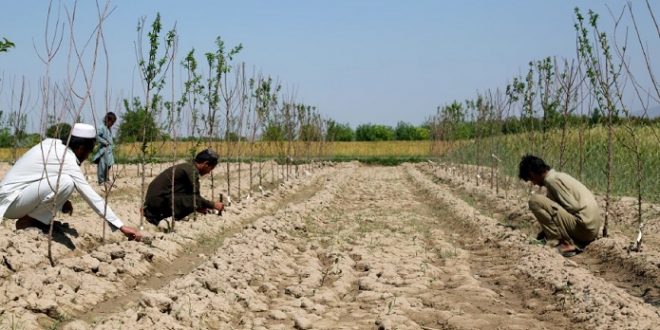By Javier Delgado Rivera
On April 5, the World Bank published its by-annual Development Update for Afghanistan. A deep look at how COVID-19, government’s performance, international circumstances, and even the weather, impacted in the country’s economy during 2020; and how it may behave during the rest of this year.
In this paper, the World Bank examines the profound burden of the pandemic in the Afghan economy, as well as in the country’s public finances and its private sector investment. In addition, the institution notes, the urban services and industry sectors were hit hard by lockdown measures and trade disruptions.
In particular, urban unemployment increased, while declining revenues limited the extent of the government’s response to the crisis.
“To help restore private sector confidence and facilitate continued international support, the government needs to demonstrate substantial progress on revenue, anti-corruption, and private sector reforms,” prescribes the World Bank.
“Donors could work towards providing greater certainty and supporting confidence by establishing multi-year commitments and defining a set of measurable reforms against which grant support will be mobilized,” indicates the international financial institution, which has so far committed 652$US million for 2021 in the country.
Crushing the numbers of a 19$US billion economy
The World Bank indicates that Afghanistan GDP contracted 1,9% in 2020, although “in the absence of new official national accounts data, growth estimates are subject to a high degree of uncertainty,” recognizes the institution.
The rural and urban dichotomy. Last year, the silver lining of the Afghan economy was perhaps its agricultural sector, estimated to have grown by 5.3% boosted by favorable weather conditions and the limited impact of COVID-19 disruptions on the rural economy.
In urban settings, the picture was less uplifting. Because of lockdown measures and border restrictions, the industry and services sectors contracted by 4.2% and 4.8%, respectively.
As a result, rural poverty levels slightly improved; something not mirrored in the cities, where rates of hardship went up.
Food prices soared due COVID-19. For starters, inflation reached 5.6% during the last year — up from 2.3% in 2019. In particular, border closures and lockdown measures led to a food price spike of 17% in April, which was moderated from May thanks to a good agricultural harvest.
On the bright side, “non-food prices remained largely stable throughout 2020 largely due to lower international energy prices,” points out the Washington-based institution.
The fiscal situation deteriorated. In 2020, overall tax revenues declined by 7.6%. An occurrence generated by suppressed consumption and low investment confidence, what led to a sharp decline in taxes and custom duties, although the third quarter experienced some recovery.
However, and despite lower-than-budgeted expenditures, the Word Bank does not expect the state coffers to ‘heal’ any time soon. “Recovery in domestic revenues is likely to remain slow,” foresees the institution. So low that the pre-pandemic rate of 14% of GDP in tax revenues will be only reached in 2024 (if the new VAT is implemented).
“Consequently, the fiscal deficit is likely to expand to 3.2% of GDP in 2021, before averaging around 1% over 2022-24,” notes the Report. A deficit mainly financed through borrowing from the International Monetary Fund (IMF) and government’s cash reserves — foreign exchange reserves remained at comfortable levels (16 months of import cover), making the Afghani stable against the US dollar.
Looking forward
The World Bank expects the Afghan GDP to grow by 1% this year, in part reflecting contraction in the agriculture sector due to the drought. In addition, recovery in the industry and services sectors is expected to be sluggish due to weak confidence for investments.
Moreover, “with rapid population growth (around 2.3%), per capita incomes are unlikely to recover to pre-COVID levels until 2025,” warns the financial institution.
The World Bank forecasts that consumer prices will increase by 3.8% this year, “reflecting recovery in global energy prices, the impacts of drought on food production, and disruptions of trade through Herat following the major fire at the Islam Qala customs point.”
When it comes to trade, the Report points out that thanks to the economic recovery and the resolution of border disruptions, “both imports and exports are likely to recover in 2021.” Nevertheless, with increases in imports outstripping increases in exports, the trade balance will worsen.
The World Bank points to four critical risks that are likely to affect the performance of the Afghan economy in the months to come: 1) a deterioration in the security situation following either the withdrawal of international troops or a breakdown in the current peace negotiations; 2) a resurgence in COVID-19 cases, which may trigger new lockdowns; 3) worse-than-expected weather conditions, impacting agricultural production and rural livelihoods; and 4) faster-than-expected reductions in international grant support due to inadequate government progress against anti-corruption and other reform.
For as long as most can remember, Afghanistan’s economy has been shaped by fragility and aid dependence. Now, a one-in-a-generation pandemic, its related global uncertainty, in addition to the current crucial stage in the country’s peace process, put the Afghan economy in a genuine troublesome spot.
Javier Delgado Rivera is Afghanistan Times UN correspondent, based in New York.
 Afghanistan Times
Afghanistan Times




